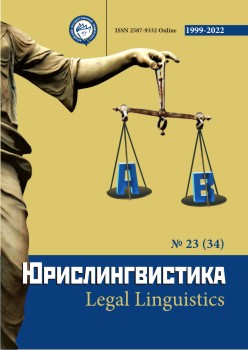"Truth" and "Law" in Russian Legal Consciousness: Conservative and Theological Motives
Abstract
The article analyses the problem of correlation between the categories of "truth" and "law" in Russian legal consciousness. The authors focus on the study of this issue mainly on the example of Russian conservative thought, justifying it by the fact that of all the theories of legal understanding only conservative legal ideology was able to express the traditional perception of law for the Russian legal consciousness. It was conservative legal scholars who drew attention to the fact that the essence of law in Russian culture is determined by the traditional worldview, which was formed back in the V-IX centuries and continues to dominate at present. It is noted that traditionally Russian legal consciousness in contrast to the European is characterized by such features as syncretistic unity of religious, moral and legal principles, united by the ideal of Pravda; the prevalence of internal, conscientious over external, formal legal side of law; lack of tangible influence of Roman law on the Russian legal tradition to the beginning of XX century. The priority of the ideals of collegiality, social service and duties; the prevalence of customary, unwritten law, expressing the people's ideals of truth, conscience, and justice. Based on the works of Hilarion, I.S. Peresvetov, I.T. Pososhkov, A.S. Khomyakov, I.S. and K.S. Aksakovs, I.V. Kirievsky, I.A. Ilyin, A.I. Solzhenitsyn, they come to the conclusion that the tradition of distinguishing law and law, pravda (grace, conscience) and formal jurisprudence is deeply rooted in Russian national culture. However, disobedience to external, positive law was justified by conservatives only under the condition of the spirit of law - the provision of religious and moral pravda. Morover, following the "letter of the law" only leads in specific legal situations to an unjust and immoral legal solution.
Downloads
Metrics
References
Аксаков К.С. Собрание сочинений. Т.I. М., 1889.
Губаева Т.В. Язык и право. Искусство владения словом в профессиональной юридической деятельности. М., 2007.
Иларион Слово о Законе и Благодати / Первые книги Святой Руси. М., 2005.
Ильин И.А. Собрание сочинений: В 10 т. Т. 4. М., 1994.
Киреевский И.В. Духовные основы русской жизни. М., 2007.
Новгородцев П.И. История философии права. СПб., 1998.
Пересветов И.С. Сочинения. М.-Л., 1956.
Посошков И.Т. Сочинения. М., 1842.
Солженицын А. И. Публицистика: В 3 т. Т. 1. Ярославль, 1995.
Сорокин В.В. Понятие и сущность права в духовной культуре России. М., 2006.
Сорокин В.В. Понятие совести в правовом измерении / История государства и права. –2009. – № 21. – С.2-6.
Томсинов В.А. Юриспруденция Древней Руси и правовая культура Византии / Вестник Московского ун-та. Серия 11. Право. – 2009. – № 4. – С.3-26.
Флоровский Г.В. Из прошлого русской мысли. М., 1998.
Хомяков А.С. Всемирная задача России. М., 2008.
Хомяков А.С. Полное собрание сочинений. Т. I. М., 1900.
Copyright (c) 2022 Антон Васильев, Юрий Зеленин

This work is licensed under a Creative Commons Attribution 4.0 International License.
The authors, which are published in this journal, agree to the following conditions:
1. Authors retain the copyright to the work and transfer to the journal the right of the first publication along with the work, at the same time licensing it under the terms of the Creative Commons Attribution License, which allows others to distribute this work with the obligatory indication of the authorship of this work and a link to the original publication in this journal .
2. The authors retain the right to enter into separate, additional contractual agreements for the non-exclusive distribution of the version of the work published by this journal (for example, to place it in the university depository or to publish it in a book), with reference to the original publication in this journal.
3. Authors are allowed to post their work on the Internet (for example, in a university repository or on their personal website) before and during the review process of this journal, as this may lead to a productive discussion, as well as more links to this published work (See The Effect of Open Access).











